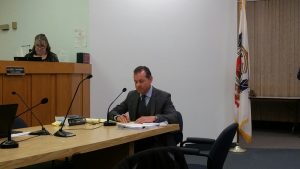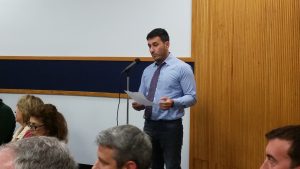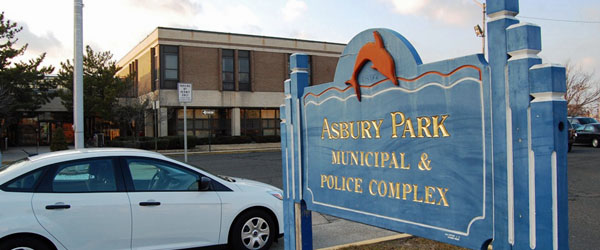Judge Dismisses Lawsuit Challenging Short Term Rental Laws In Asbury Park
Raffetto: Item Remains On November Ballot But Upholds City's Current Guidelines
Superior Court Judge Linda Grasso Jones has dismissed a lawsuit challenging the City of Asbury Park’s Short Term Rental ordinance, which took effect in November.
Brought forth by Jon Biono and Timothy Horman [as individual members of a committee of petitioners], the suit aimed to bar enforcement of the local laws governing how Airbnb type rentals are conducted until voters could cast their ballot in November.
City Clerk Cindy Dye said in November that Biono had collected enough valid signatures to have an alternate ordinance he and a committee of petitioners put forth placed on the November ballot.
The alternative ordinance called for less restriction on who could offer short term rentals.

But the City Council moved forward and unanimously voted to approve its regulations, which prohibits investor owned properties from offering the less than 30 day rentals; popular on websites like Airbnb, Vacation Rentals by Owner [VRBO], and Homeaway.
City Attorney Fred Raffetto [at right] said the lawsuit was dismissed with prejudice and the challengers will have 45 days to appeal. The City opted not to file an answer to the lawsuit, instead choosing to file a motion to dismiss the lawsuit on legal grounds, he said.
Grasso Jones’ decision does not remove the alternate ordinance from being placed on the November ballot, Raffetto said.
“Although the Judge supported the City’s decision entirely, saying we had the right to adopt our ordinance, she stated that she did not have the authority in this proceeding to dismiss the ballot question,” Raffetto said. “There would need to be a separate proceeding to make a determination on the ballot question.”
Biondo [below right], who has challenged the short term rental ordinance throughout its vetting, introduction and adoption, said he will not be appealing the decision.
“We will leave it up to the voters,” he said. “While the Court refused to enjoin the City from  enforcing it’s burdensome new law barring 90 percent of the city’s residents from exercising their constitutional property rights, it did wisely affirm that our common sense law will be on the ballot in November. The court’s decision was internally inconsistent and could be successfully appealed but a decision probably wouldn’t be rendered before November anyway. Once city residents have an opportunity to vote yes in November to replace the city’s absurd restrictions with a sensible and fair law, this situation will be rectified without further judicial intervention.”
enforcing it’s burdensome new law barring 90 percent of the city’s residents from exercising their constitutional property rights, it did wisely affirm that our common sense law will be on the ballot in November. The court’s decision was internally inconsistent and could be successfully appealed but a decision probably wouldn’t be rendered before November anyway. Once city residents have an opportunity to vote yes in November to replace the city’s absurd restrictions with a sensible and fair law, this situation will be rectified without further judicial intervention.”
So, absent any further judicial intervention, the ballot question remains, Raffetto said.
The challenger’s ordinance, which speaks to multifamily and single family homes, by chance prohibits two-family short term rentals, which the city’s ordinance does cover. The distinction here is that under the City ordinance a short term rental may only be allowed in an owner occupied property.
“It is not an absolute fact that our law [ordinance] bars two-family short term rentals,” Biondo said. “The term multifamily is not defined in the code like “multiple dwelling is. It’s not settled law that our ballot question would be interpreted that way given that it has not been enforced as law yet. So it’s speculative and taints the question for the voters by stating it as fact.”
The challengers’ argument did not challenge the point, instead it rested on a precedent made in the 2015 Redd v Bowman case that used the Faulkner Act governance to support their case that the initiative process could place a stay on the City law.
“This order now puts that litigation to rest with prejudice and confirms that the City was in fact fully authorized to adopt its ordinance and was not estopped from doing so as Mr. Biondo and the Committee contended,” Raffetto said in reading a statement into record Wednesday. “As such the City’s ordinance remains the law that is in effect regarding short term rental provisions in the city at this time.”
The City’s Short Term Rental guidelines are as follows:
The ordinance applies to stays outside of already regulated hotels, motels, bed and breakfasts, rooming houses, boarding houses, foster homes, shelters, assisted living facilities and nursing homes.
Properties operated under the 2017 Summer Rental License that are not owner-occupied primary residences are exempt from the owner-occupancy requirement until a transfer of ownership.
The $300 annual permit opens up several new classifications of housing in the short-term market, including renting out a single room in a house and a condominium unit if the homeowners association permits it.
A single unit in a two-family home may be rented short-term if the owner occupies the other unit as their primary residence. Multiple units in a multi-family home can be rented short term provided the homeowner lives in one of them as a primary residence.
Apartment units are prohibited from renting short term from either the owner of the unit or the lessee.
Summer rentals or stays longer than 30 days do not fall under the same regulation requiring the homeowner live on the premises.
The new ordinance requires that short-term renters be at least 21 years of age.
———————————————————————————————————–
Follow the Asbury Park Sun on Facebook, Twitter and Instagram.
The Asbury Park Sun is affiliated with the triCityNews newspaper.















